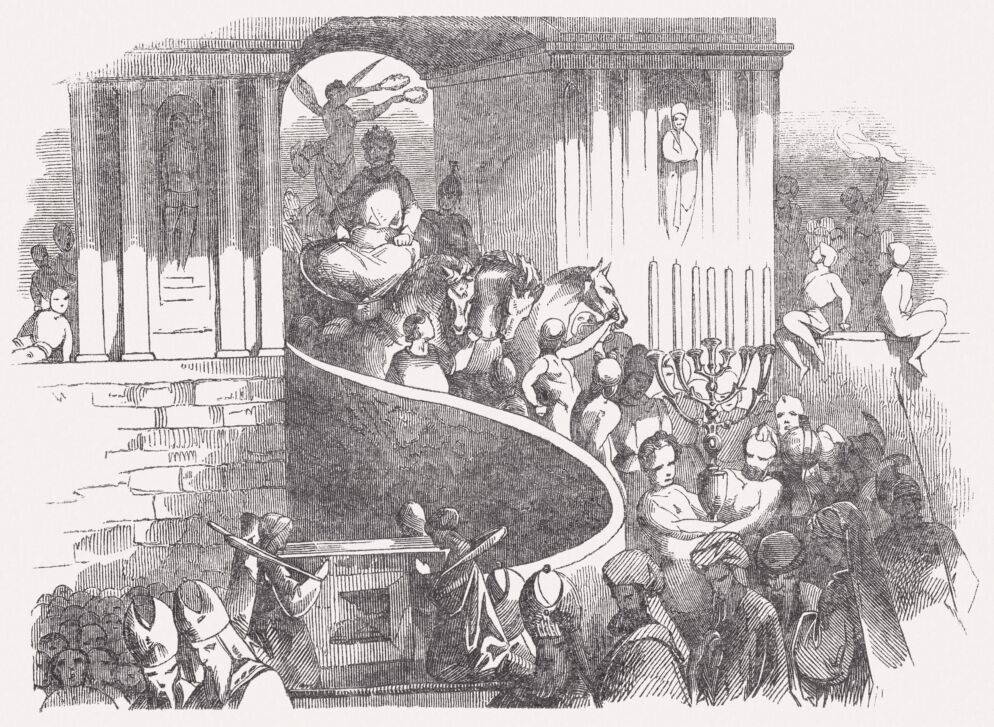From the evening of July 26 to the evening of July 27, the Jewish community will mark Tisha B’Av, a particularly somber occasion.

Known as the saddest day on the Jewish calendar, the date marks several tragedies, most notably the destruction of both Temples in Jerusalem. But it also marks the day the spies returned from the Promised Land and God commanded the Israelites to wander the desert for 40 years, the failed Bar Kochba revolt against the Romans and the banishment of Jews from England and Spain during the 13th and 15th centuries, according to Chabad.org.
For those who observe Tisha B’Av traditions, the day is a quiet and reflective one. Tisha B’Av is a fast day. Torah study is discouraged unless it relates to the destruction of the Temple or another sad topic. For services, synagogues dim their lights and remove the decorative curtains from the ark.
Many of the events that Tisha B’Av commemorates occurred hundreds, even thousands, of years ago. The Union for Reform Judaism states on its website that the date is no longer considered ritually significant for many liberal Jews. So why do some still consider it important to observe the day after all this time?
In part, it is because the tragedies of Tisha B’Av are historically significant and are still relevant, not only because of the impact they have had but because of the lessons that can be gleaned from them.
“The Jewish people didn’t have faith in God and in Moses that the land of Israel was a good place for them, and instead believed the negative information that came from the spies,” explained Leslie Klein, a contemporary Jewish historian and the academic dean of Women’s Institute of Torah Seminary & College in Baltimore. “They believed the ‘fake news’ they were told that night, and God punished them for it.”
Tisha B’Av is not only an occasion to reflect on the tragedies that occurred on the 9th of Av, but during the totality of Jewish history. Many use the date as an opportunity to mourn for victims of the Holocaust and of other devastating events.
“It’s a communal day of mourning for all the tragedies that have happened to Jewish people throughout our history,” Klein added. “We are one nation, so your tragedies are my tragedies.”
In addition, this year is a hakhel year, a tradition that has been revived by some in modern times. Hakhel is a biblical commandment that every seven years, Jewish people should travel to the Temple in Jerusalem to hear a Torah reading.
The destruction of both Temples means this is no longer possible, and Jewish people who observe hakhel in modern times use it to reunite with their friends and other members of their community.
The fact that hakhel persists to this day is a testament to the sense of community among the Jewish people, said Rochel Kaplan, director and founder of the Aleph Learning Institute.
“The Temple was God’s beloved home, and ours, too,” she explained. “There was a problem of sinat chinam, baseless hatred, at the time before the Temple’s destruction. During Tisha B’Av, our objective is to do the opposite, to spread love amongst our Jewish brothers and sisters and stand together in our mourning.”
Both Tisha B’Av and the wider practice of the hakhel year aim to promote unity among the Jewish people, in joy and in sorrow.
“We love to do things that inspire us,” Kaplan said. “Like honoring Jewish culture and tradition… we wouldn’t be a people without it.”
Recent years have seen an effort to position Tisha B’Av as a day to honor the strength and persistence of the Jewish people as well as their loss.
In an article written for Reconstructing Judaism, Rabbi Lewis Eron argued that doing as such would be a powerful way to make the occasion more potent for the Jewish people, and a way to reframe them not as victims, but as survivors.
“To speak to us today, Tisha B’Av can not [sic] longer be the day on which we remember all the evil that has happened to us,” he wrote. “It needs to become the day on which we understand that despite our setbacks, our struggles, our real losses and deep suffering, we, the Jewish people, have overcome the obstacles fate has set before us.”
While mourning remains the primary goal of Tisha B’Av, the fact that the Jewish people have experienced so many hardships and still persist as a nation today is an inspiring one. It is a testament to the resilience of the Jewish people, and that they will not forget what has happened to them as they work toward a better future.
“It’s important to remember what we’ve lost, physically and spiritually. We lost something, and even 2,000 years later, commemorating Tisha B’Av shows that we yearn for redemption,” Klein said. “There’s an importance in remembering where we come from and what’s important to us as a nation. It is easy to lose sight of that, but ultimately we are affirming our unity, that we care about each other, even while recognizing what we’ve lost. We are a nation that does not forget.”







